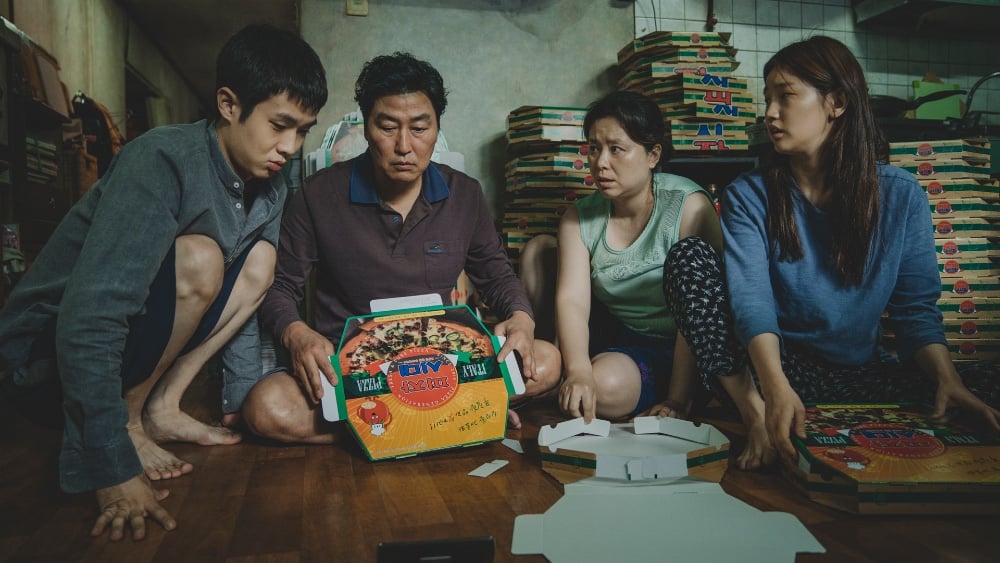Ki-taek Kim (Kang-ho Song) and his family live in abject poverty in a basement flat. His son Ki-woo (Woo-sik Choi, who appeared in Director Bong’s Okja) is recommended by a friend for an English tutoring job for the teen daughter of the wealthy Park family. Once he wins over her neurotic mother (Yeo-jeong Jo), Ki-woo sees an opportunity to bring in his teen sister Ki-jung (So-dam Park) to use “art therapy” on the woman’s unruly younger son. Very soon, the entire Kim family has taken roles in the Park household, the father as Mr. Park’s driver and their mother as the housemaid – getting rid of both their predecessors via devious means. Things are definitely looking up for the impoverished Kim family… and then the original housemaid returns…

Really, that’s all you’re going to get from me about the plot of Parasite. It takes about an hour to set up all of those pieces in order to create the hour of absolute unadulterated mayhem that follows. What Director Bong has going with Parasite is another great, original concept, handled in his own inimitable way. It’s immediately apparent and almost obvious that entire point of his film is to show the difference in class systems in his homeland. The Kim family is reminiscent of the family from The Host and even the father/daughter relationship from Okja, and Bong uses their poverty to show how people with no money have to be smarter than those who already have way too much of it.
Kang-ho Song has been the De Niro to Director Bong’s Scorsese since his earlier film Memories of Murder, and he’s played a similar role in the career of Bong’s country-mate Park Chan-wook and played the “weird” portion of Jee-won Kim’s The Good, The Bad and the Weird. He’s a fantastic actor, maybe one of Korea’s best, and yet, Parasite is very much an ensemble piece where all the actors are given moments to shine.
It’s in these interactions where the film delivers some of its best fireworks, but much of that has to do with the frenetic pace in which Bong directs the violent and sometimes quite gory action sequences. It constantly straddles a rather unwritten line between comedy and thriller that makes it hard to pin down or even describe.
At times, Parasite is a movie where the production design — especially in contrasting the living spaces of the two families — and the cinematography are so gorgeous, it sometimes overpowers the storytelling. It’s a bit like Park Chan-wook’s similarly weird and glorious The Handmaiden in that sense.

What mystifies me is that, as good as the movie is, the movie has been elevated onto a ridiculously high pedestal since winning the Palm D’or, as if the filmmaking should come as some sort of surprise. Director Bong has been making films this good for over 20 years, and South Korea in general has been delivering so many great films and filmmakers that have mostly gone ignored by American critics and moviegoers alike. Parasite really is on par with most of Bong’s Korean films including Mother and The Host, though that doesn’t mean it will play as good or better for mainstream American audiences as something like Director Park’s Old Boy.
It’s possible that Bong has found a new audience of younger cinephiles after his previous film Okja streamed on Netflix. That wasn’t even remotely his best film, but Parasite is so drastically superior, people are falling over themselves to praise it. As a long-time fan, that thrills me to no end one the one hand; at the same time, it feels as if I’m losing what once felt like my own special film critic’s secret to what will inevitably turn into a gig directing Marvel movies. I really should be happier about this, but it’s tough.
Despite my misgivings, Parasite is another fantastically outrageous and weird film from South Korea that continues to show the glory of that country’s cinema and Director Bong as its master. It still won’t be for everyone, but if it gets a few thousand more Americans to give Korean cinema a chance, then it’s done its job.
Rating: 8/10
Parasite will play October 5-7 as part of the 57th New York Film Festival, and then it will open theatrically on October 11.









Comments are closed.